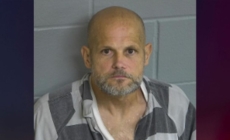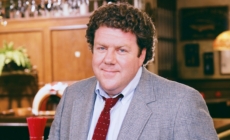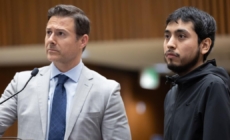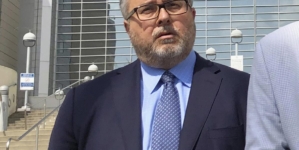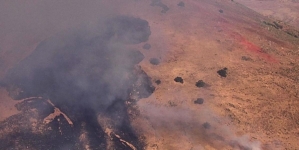-
Florida man convicted in 2004 cold case death of victim whose remains have not been found - 10 mins ago
-
‘Cheers’ actor George Wendt’s death linked to heart conditions - 12 mins ago
-
Musk On If Trump Should Be Impeached: ‘Yes’ - 19 mins ago
-
FOX Super 6 contest: Chris ‘The Bear’ Fallica’s Belmont Stakes picks - 26 mins ago
-
Prison for Instagram? L.A. authorities target street racing influencer - 38 mins ago
-
Tesla stock price plunges as Trump suggests stripping Elon Musk’s companies of federal contracts - 46 mins ago
-
Man sentenced for fatally severing the spine of ex-girlfriend’s 2-year-old daughter - 54 mins ago
-
Former NFL QB Suggests Shocking Trade Idea for Dolphins’ Tyreek Hill - 58 mins ago
-
Kylian Mbappé converts on penalty, helps France trim deficit vs. Spain - about 1 hour ago
-
Trump travel ban causes confusion and disappointment abroad - about 1 hour ago
The real problem with L.A. Latino politics isn’t City Council boundaries
It’s been nearly two years since a secretly recorded conversation featuring Los Angeles political heavyweights rocked City Hall — and really, what has changed?
Sure, then-City Council president Nury Martinez — who disparaged Oaxacans and described a young Black boy as a monkey — resigned and has stayed away from politics. But Gil Cedillo — who claimed on the recording that the three City Council districts held by Black representatives were actually “Latino seats” — served out the rest of his council term and now traipses from one Latino cultural event to another like a Chicano “Emily in Paris.”
Meanwhile, Councilmember Kevin de León — who said during the hour-long conversation that Black political power was as fake as the Wizard of Oz — is running for reelection. Ron Herrera — who quit as head of the L.A. County Federation of Labor after The Times broke the story — has returned to public life, donating money to De León’s campaign and showing up to his debates.
And now, one recurring theme in their vulgar, racist chat — that Latinos do not have sufficient voting power in Los Angeles — seemingly has a powerful champion in California Atty. Gen. Rob Bonta.
As first reported by my colleagues David Zahniser and Dakota Smith, Bonta is pushing city officials to redraw council district boundaries before the 2026 primary election. California’s top lawman has voiced concerns that the map approved by the City Council three years ago doesn’t provide Latinos in some districts with “the opportunity to elect the candidate of their choice,” according to sources.
A spokesperson for Bonta’s office said he was “unable” to comment for this column. At a news conference Friday at the Central Library in downtown L.A. to discuss voting rights, Bonta would say only that an investigation was ongoing and that he looked “forward to that time” when he could say more.
Latinos are nearly half of L.A.’s population but occupy just a third of the council’s 15 seats. The lack of Latino representation has been a civic embarrassment since Ed Roybal became the first Latino on the City Council in modern times, way back in 1949.
Get-out-the-vote campaigns, political machines, voting rights lawsuits, protests — activists and politicians have tried to achieve equity at City Hall and just can’t seem to get there.
They have offered all sorts of reasons why. The one that’s getting the most play in this campaign season was repeated as a mantra on the leaked audio: that gentrification is messing with the voting rights of working-class Latinos.
Rep. Edward Roybal (D-L.A.) addresses students at Hazard Park in 1968. He was the first Latino elected to the Los Angeles City Council in modern times.
(Los Angeles Times)
The state attorney general has flagged Eastside districts 1 and 14 — traditionally Latino strongholds — as “areas of concern,” according to the sources who spoke to Zahniser and Smith. District 1, formerly held by Cedillo, and District 14, represented by De León, have seen an influx of white people and upwardly mobile Latinos over the past generation.
On the recording — which captured a conversation held in 2021 but leaked in the fall of 2022 — Cedillo basically begged Martinez to keep hipsters away from his district.
“Elysian Valley is a headache,” Cedillo said. “Eagle Rock’s a headache. Highland Park’s a headache. And Lincoln Heights. I don’t need those headaches. I have poor people. La Raza.”
“It’s not [for] us,” De León later added. “It’s for Latino strength for the foreseeable future.”
Indeed, Cedillo lost his seat to Eunisses Hernandez, a young Latina who got next to no support from the Eastside Latino political establishment and instead relied on a multicultural progressive coalition.
In his reelection campaign, De León is facing off against Ysabel Jurado, a Filipina American political novice who placed first in the March primary ahead of De León and two Latino Assembly members. Jurado is relying on the same coalition as Hernandez did, while picking up more Latino political support, including Councilmember Hugo Soto-Martínez, L.A. County Supervisor Hilda Solis, L.A. Unified School District trustee Rocio Rivas and Hernandez herself.
Ethnic communities in this country have voted for representatives that look like them since the 19th century. Latino politicians in L.A. have ridden this political horse since the Roybal days, and that’s what De León is banking on to take him to the proverbial finish line. But anyone who thinks that Latinos vote only for Latinos in today’s city is seriously mistaken — or a Chicanosaurus.
The council district with the highest percentage of eligible Latino voters is District 9 in South L.A., at nearly 65%. That’s more than double the percentage of eligible Black voters, which is just 24%. Yet incumbent Curren Price has won all three of his elections against Latino opponents, increasing his margin of victory each time.
District 15, which covers harbor communities and Watts, also has a voting-eligible population that is majority Latino. On the leaked audio, Cedillo said that homegrown “young Chicano union members, longshoremen” should represent the area.
Voters had a chance to make that happen in 2021, when Danielle Sandoval, a former International Longshore & Warehouse Union district delegate and member of the San Pedro and Harbor City neighborhood councils, made it to the general election against Tim McOsker.
McOsker easily won, after The Times revealed that a restaurant that Sandoval was associated with owed tens of thousands of dollars in back wages to former employees. What really hampered Sandoval, however, was a lack of endorsements from prominent Latino politicians, who dropped their usual cant of Latino power to back the white guy over the Latina.
That’s the realpolitik that Bonta shouldn’t ignore, because it’s long happened in L.A. and is playing out this November in the San Fernando Valley.
According to Zahniser and Smith’s reporting, Bonta’s team has discussed the possibility of creating a third “Latino” district in the San Fernando Valley — one with a significant concentration of Latino voters. That’s something Latino residents have long pined for, to join the seats held by Imelda Padilla and Monica Rodriguez.
The easiest fix would be redrawing District 2, which covers the southeast portion of the Valley, borders Padilla and Rodriguez’s districts, has a 33% voter-eligible Latino population and is represented by termed-out Paul Krekorian.
Voters there have a chance to elect a Latina in November: Jillian Burgos, who’s running against former Assemblymember Adrin Nazarian.
Yet the only prominent Latino elected official to endorse Burgos is L.A. Unified trustee Kelly Gonez, who’s not part of the Latino political machine that has run the northeast Valley for the past quarter-century.
Instead, Latino politicians across the city are standing behind Nazarian, who once served as Krekorian’s chief of staff.
On the leaked audio that brought down her career, Martinez — long the field general for that Valley Latino machine — dismissed calls by Cedillo, De León and Herrera to redraw Krekorian’s district to favor a future Latino candidate.
“Don’t mess up the Valley, ’cause we’re cool in the Valley,” she told them. “Nobody wants a little Armenian love? I mean, they haven’t done anything to us.”
Hey, Rob Bonta: Maybe you should investigate Latino politicians who don’t support Latinos running against non-Latinos? On second thought, no: that would be like trying to count every pine needle in Yosemite.
Source link
